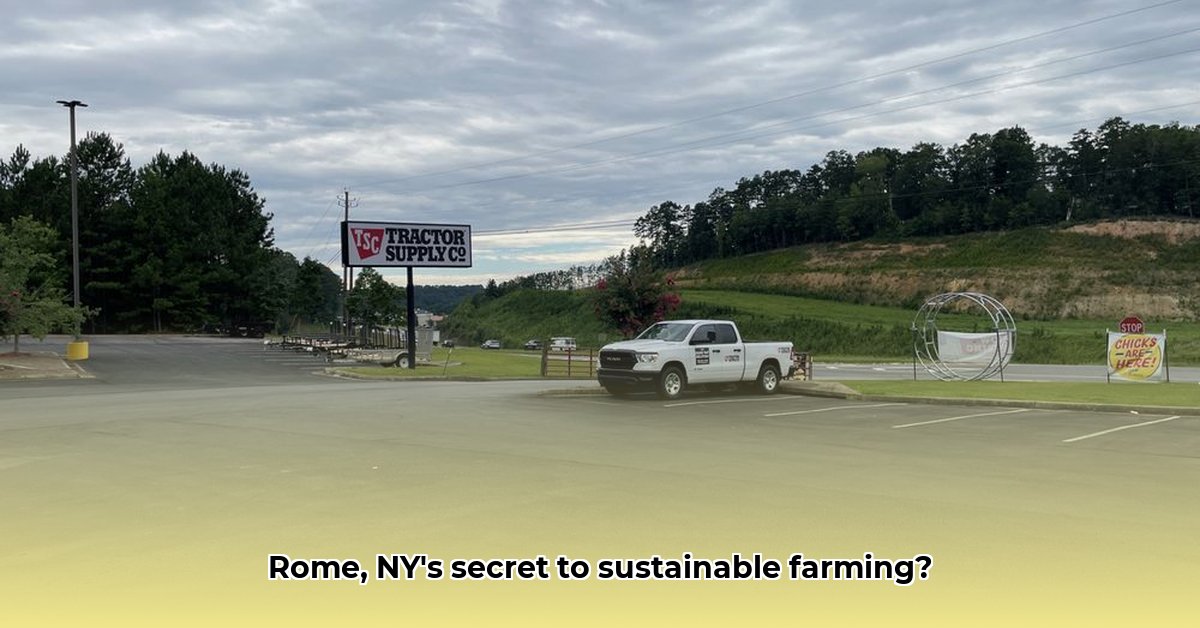
Rome, New York, boasts a rich agricultural heritage. However, modern farming in the region faces challenges, including climate change impacts, fluctuating market prices, and the growing demand for sustainable practices. This case study examines Tractor Supply's Rome location and its potential to support more environmentally friendly farming methods. Our analysis reveals both opportunities and significant limitations in Tractor Supply's current role. For more information on the Rome location, visit the Tractor Supply Rome store page.
Rome's Agricultural Landscape: Existing Realities
Rome's agricultural history is extensive, with generations of families dedicated to farming. Current farmers, however, contend with unpredictable weather patterns caused by climate change and scarce water resources. Economic pressures, such as fluctuating commodity prices and rising input costs, exacerbate these difficulties. While many farmers are keen to adopt sustainable practices, they often lack access to resources or sufficient information. The region currently offers limited support for sustainable farming initiatives, creating a considerable gap in resources and knowledge.
Tractor Supply's Potential Contribution
Tractor Supply's prominent Rome location offers significant potential to influence the local agricultural landscape. Its accessible location within Oneida County makes it a central hub for farmers seeking supplies. This geographic advantage could improve access to resources supporting sustainable agricultural practices. The store's proximity to major transportation routes further enhances its potential, facilitating efficient delivery of essential goods.
However, the extent to which Tractor Supply actively supports sustainable farming remains unclear. The co-location with a mobile veterinary clinic hints at potential synergy. Healthy livestock are essential for successful farms, and readily available veterinary care can significantly benefit local livestock farmers, ultimately promoting sustainable livestock farming practices. But this alone is not sufficient.
Examining the Reality: Data Gaps and Limitations
Crucial information is lacking to fully assess Tractor Supply's impact. A thorough understanding of the store's inventory is needed. Does it stock essential products for sustainable practices, including organic seeds, water-efficient irrigation systems, and soil conservation tools? This is currently unknown. Further research is essential to understand the range and availability of these items. A detailed product inventory analysis is necessary.
Similarly, information regarding community engagement remains limited. Does Tractor Supply actively engage with local organizations dedicated to sustainable agriculture? If so, what is the nature and extent of these partnerships? Collaborating with these organizations could greatly expand their positive impact. The current lack of information prevents a thorough assessment of this aspect.
Actionable Recommendations: A Multi-Faceted Approach
Realizing Tractor Supply's full potential in supporting sustainable agriculture requires a multi-faceted strategy:
Comprehensive Inventory Analysis: Tractor Supply should conduct a comprehensive review of its product offerings, actively identifying gaps in sustainable agricultural products and prioritizing their inclusion. This assessment should involve feedback from local farmers to tailor offerings to their specific needs.
Strengthening Community Partnerships: Tractor Supply should actively forge collaborations with local organizations promoting sustainable agriculture. This could involve joint educational workshops, farmer's market presence, or other outreach programs. A clear strategy for community engagement is crucial.
Government Incentives: Regional and local governments can incentivize businesses supporting sustainable agriculture through tax breaks or grants for retailers stocking and promoting environmentally friendly products.
Direct Farmer Engagement: Tractor Supply should organize workshops and seminars educating farmers about sustainable practices and the available products. Direct outreach and tailored guidance will improve adoption rates among farmers.
Conclusion: A Collaborative Path Forward
Tractor Supply holds significant potential to bolster sustainable agriculture in the Rome area. However, this potential needs focused development through comprehensive research and strong collaboration. Continued investigation is needed to clarify various aspects and fully grasp the local farmers' needs. This includes analyzing customer demographics to better understand the customer base and their priorities. Moreover, an investigation into Tractor Supply Corporation's broader sustainability programs will provide valuable context. Ultimately, a joint effort uniting the retailer, farmers, local government, and environmental NGOs is key to creating a more sustainable agricultural future in the Rome, NY region.
Areas Requiring Further Research
To paint a complete picture, further research is essential in these areas:
- Detailed Product Inventory: A thorough inventory analysis is required to accurately assess the range and availability of eco-friendly products.
- Customer Base Demographics: Understanding the needs and preferences of Tractor Supply's farmer customers is critical for effective support.
- Tractor Supply's Corporate Sustainability Initiatives: Evaluating Tractor Supply Corporation's broader sustainability commitments will reveal their overall approach to environmentally friendly initiatives.
This case study stresses the need for continued investigation. Only through comprehensive research can we fully assess Tractor Supply's contribution to a sustainable agricultural future for the Rome, New York community.